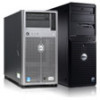Dell PowerEdge 2321DS Dell 1082DS/2162DS/4322DS Remote Console Switch Softw - Page 11
Sorting, IPv4 and IPv6 Network Address Capabilities
 |
View all Dell PowerEdge 2321DS manuals
Add to My Manuals
Save this manual to your list of manuals |
Page 11 highlights
• The Explorer only shows the target devices listed in its database, with the name specified in the database. In other words, the Explorer does not talk to the switch to obtain target device information. • The Resync Wizard overwrites locally-defined target device names only if the switch target device name has been changed from the default value. Non-default target device names that are read from the switch during a resynchronization override the locally-defined names. Sorting In certain displays, the software component displays a list of items with columns of information about each item. If a column header contains an arrow, you can sort the list by that column in ascending or descending order. To sort a display by a column header, click the arrow in a column header. The items in the list are sorted according to that column. An upward-pointing arrow indicates the list is sorted by that column header in ascending order. A downward-pointing arrow indicates the list is sorted by that column header in descending order. IPv4 and IPv6 Network Address Capabilities The RCS software is compatible with systems using either of the currently supported Internet Protocol Versions, IPv4 (default) or IPv6, or both the IPv4 and IPv6 modes simultaneously. The IPv4 mode connection can be either a stateful (configuration and IP addresses are provided by the server) or a stateless (the switch normally receives the IP address and router address dynamically from the router) autoconfiguration. Switch firmware upgrades and emergency boot firmware upgrades are supported for both TFTP and FTP servers while in IPv4 mode. The IPv6 mode is a stateless, auto-configuration connection. While in IPv6 mode, switch firmware upgrades are only facilitated in FTP mode and emergency boot firmware flash downloads cannot be performed. To perform a flash download, you must temporarily connect to an IPv4 network with a TFTP server. Product Overview 5















